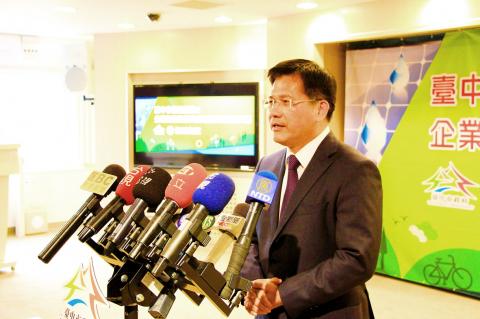The East Asian Olympic Committee yesterday announced that it has revoked Taichung’s right to host the first East Asian Youth Games due to “political factors” after the city had already spent nearly NT$677 million (US$22.04 million) on preparations for the event.
The government denounced what it called China’s “barbaric” interference in the committee.
The decision was made at a provisional committee meeting in Beijing yesterday, reportedly due to pressure from China, which is unhappy about a referendum proposal to rename Taiwan’s national sports team from “Chinese Taipei” to “Taiwan” for the 2020 Tokyo Olympics.

Photo: CNA
The committee is comprised of representatives from Taiwan, China, Hong Kong, Macau, North Korea, South Korea, Mongolia, Japan and Guam.
All members except Taiwan and Japan voted against Taichung retaining the right to host the Games, the Ministry of Foreign Affairs said.
Taiwan voted in favor of Taichung hosting the event, while Japan abstained, it said.
Taichung in October 2014 won the bid to host the Games, which would have been the first within the Olympic family hosted by Taiwan. They were preceded by the East Asian Games, which in 2013 transformed into a youth sports event.
The Taichung City Government said that since winning the bid, it has poured NT$677 million into planning and building facilities for the Games, in which nearly 2,300 athletes from nine nations were expected to participate.
Calling the decision regrettable, the city government urged the committee to refrain from sacrificing the rights of athletes due to political interference.
“Doing so not only runs counter to the Olympic spirit and sporting ethics, but also nullifies all of the efforts young athletes and Taichung residents have invested in the Games,” the city government said in a statement, adding that it would take the case to the international community.
The Presidential Office also expressed strong regret over the decision and Beijing’s irrational behavior.
“Sports transcend borders and are conducive to fostering mutual understanding among people from different nations and of different ethnicities. They are the best catalyst for the promotion of harmony in the international community,” it said.
The decision showed that the committee did not take the Games seriously and was subjecting Taichung to extremely unfair treatment, it added.
The ministry said it was infuriated by the decision and the damage China has caused to sporting events and exchanges for political reasons.
It said that upon learning that China was interfering with Taichung’s right to host the Games, it immediately instructed its overseas representative offices in Japan, South Korea, Mongolia and Palau — which also oversees affairs in Guam — to lobby for the city to retain the Games.
“Unfortunately, we were not able to stop China’s brutal actions, but we appreciate Japan’s support,” the ministry said, urging China to leave politics out of sporting events and calling on like-minded nations to make a joint effort to stop Beijing’s destructive behavior.
Additional reporting by CNA

SECURITY: As China is ‘reshaping’ Hong Kong’s population, Taiwan must raise the eligibility threshold for applications from Hong Kongers, Chiu Chui-cheng said When Hong Kong and Macau citizens apply for residency in Taiwan, it would be under a new category that includes a “national security observation period,” Mainland Affairs Council (MAC) Minister Chiu Chui-cheng (邱垂正) said yesterday. President William Lai (賴清德) on March 13 announced 17 strategies to counter China’s aggression toward Taiwan, including incorporating national security considerations into the review process for residency applications from Hong Kong and Macau citizens. The situation in Hong Kong is constantly changing, Chiu said to media yesterday on the sidelines of the Taipei Technology Run hosted by the Taipei Neihu Technology Park Development Association. With

A US Marine Corps regiment equipped with Naval Strike Missiles (NSM) is set to participate in the upcoming Balikatan 25 exercise in the Luzon Strait, marking the system’s first-ever deployment in the Philippines. US and Philippine officials have separately confirmed that the Navy Marine Expeditionary Ship Interdiction System (NMESIS) — the mobile launch platform for the Naval Strike Missile — would take part in the joint exercise. The missiles are being deployed to “a strategic first island chain chokepoint” in the waters between Taiwan proper and the Philippines, US-based Naval News reported. “The Luzon Strait and Bashi Channel represent a critical access

‘FORM OF PROTEST’: The German Institute Taipei said it was ‘shocked’ to see Nazi symbolism used in connection with political aims as it condemned the incident Sung Chien-liang (宋建樑), who led efforts to recall Democratic Progressive Party (DPP) Legislator Lee Kun-cheng (李坤城), was released on bail of NT$80,000 yesterday amid an outcry over a Nazi armband he wore to questioning the night before. Sung arrived at the New Taipei City District Prosecutors’ Office for questioning in a recall petition forgery case on Tuesday night wearing a red armband bearing a swastika, carrying a copy of Adolf Hitler’s Mein Kampf and giving a Nazi salute. Sung left the building at 1:15am without the armband and apparently covering the book with a coat. This is a serious international scandal and Chinese

COUNTERINTELLIGENCE TRAINING: The ministry said 87.5 percent of the apprehended Chinese agents were reported by service members they tried to lure into becoming spies Taiwanese organized crime, illegal money lenders, temples and civic groups are complicit in Beijing’s infiltration of the armed forces, the Ministry of National Defense (MND) said in a report yesterday. Retired service members who had been turned to Beijing’s cause mainly relied on those channels to infiltrate the Taiwanese military, according to the report to be submitted to lawmakers ahead of tomorrow’s hearing on Chinese espionage in the military. Chinese intelligence typically used blackmail, Internet-based communications, bribery or debts to loan sharks to leverage active service personnel to do its bidding, it said. China’s main goals are to collect intelligence, and develop a